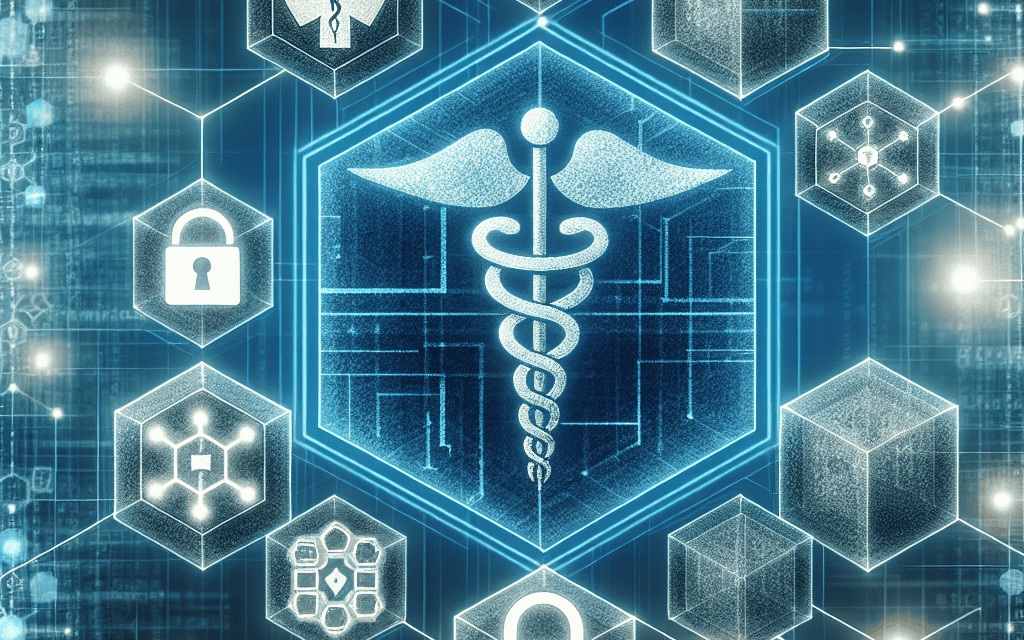-
Table of Contents
- Blockchain Technology: Ensuring Security in Healthcare Data
- Understanding Blockchain Technology
- The Basics of Blockchain
- Key Features of Blockchain
- Blockchain in Healthcare
- Applications of Blockchain in Healthcare Data Security
- Secure Patient Data Management
- Interoperability
- Supply Chain Management
- Clinical Trials
- Patient Consent Management
- Benefits of Blockchain in Healthcare Data Security
- Enhanced Data Protection
- Improved Patient Privacy
- Increased Transparency
Blockchain Technology: Ensuring Security in Healthcare Data

In the digital age, the healthcare industry is increasingly reliant on technology to manage and store vast amounts of sensitive patient data. With this reliance comes the critical need for robust security measures to protect against data breaches and unauthorized access. Blockchain technology, known for its decentralized and secure nature, offers a promising solution to these challenges. This article explores how blockchain can enhance the security of healthcare data, examining its potential applications, benefits, and challenges.
Understanding Blockchain Technology
Blockchain technology is a decentralized digital ledger that records transactions across multiple computers in a way that ensures the data is secure, transparent, and immutable. Each block in the chain contains a list of transactions, and once a block is added to the chain, it cannot be altered without altering all subsequent blocks, which requires consensus from the network. This makes blockchain inherently secure and resistant to tampering.
The Basics of Blockchain
At its core, blockchain is a distributed database that maintains a continuously growing list of records, called blocks, which are linked and secured using cryptography. Each block contains a cryptographic hash of the previous block, a timestamp, and transaction data. This structure ensures that once data is recorded, it cannot be altered retroactively without the consensus of the network.
Blockchain operates on a peer-to-peer network, where each participant, or node, has access to the entire database and its complete history. This decentralization eliminates the need for a central authority, reducing the risk of a single point of failure and enhancing security.
Key Features of Blockchain
- Decentralization: Unlike traditional databases that are controlled by a central authority, blockchain is distributed across a network of computers, making it less vulnerable to attacks.
- Transparency: All transactions are visible to participants in the network, promoting accountability and trust.
- Immutability: Once data is recorded on the blockchain, it cannot be altered, ensuring the integrity of the information.
- Security: Blockchain uses advanced cryptographic techniques to secure data, making it highly resistant to hacking and fraud.
Blockchain in Healthcare
The healthcare industry is increasingly exploring blockchain technology to address various challenges, particularly in data security and interoperability. By leveraging blockchain, healthcare organizations can create a secure and transparent system for managing patient data, improving trust and collaboration among stakeholders.
Blockchain can be used to create a unified and secure platform for storing and sharing patient records, ensuring that data is accessible only to authorized parties. This can help prevent data breaches and unauthorized access, which are significant concerns in the healthcare sector.
Applications of Blockchain in Healthcare Data Security
Blockchain technology offers several applications in healthcare data security, each with the potential to transform how patient information is managed and protected. These applications include secure patient data management, interoperability, supply chain management, clinical trials, and patient consent management.
Secure Patient Data Management
One of the primary applications of blockchain in healthcare is secure patient data management. By storing patient records on a blockchain, healthcare providers can ensure that data is secure, accurate, and accessible only to authorized individuals. This can help prevent data breaches and unauthorized access, which are significant concerns in the healthcare sector.
Blockchain can also facilitate the secure sharing of patient data between healthcare providers, improving collaboration and coordination of care. This can lead to better patient outcomes and more efficient healthcare delivery.
Interoperability
Interoperability is a major challenge in the healthcare industry, with different systems and providers often unable to communicate effectively. Blockchain can help address this issue by providing a standardized and secure platform for data exchange.
By using blockchain, healthcare organizations can create a unified system for storing and sharing patient data, ensuring that information is accessible to all authorized parties. This can improve coordination of care and reduce the risk of errors and duplications.
Supply Chain Management
Blockchain can also be used to enhance supply chain management in the healthcare industry. By providing a transparent and immutable record of transactions, blockchain can help ensure the integrity and authenticity of medical products.
This can help prevent counterfeit drugs from entering the supply chain, protecting patients and ensuring that they receive safe and effective treatments. Blockchain can also improve traceability, allowing healthcare organizations to track products from manufacturer to patient.
Clinical Trials
Clinical trials are a critical component of medical research, but they are often plagued by issues such as data manipulation and lack of transparency. Blockchain can help address these challenges by providing a secure and transparent platform for managing trial data.
By using blockchain, researchers can ensure that trial data is accurate and tamper-proof, improving the credibility and reliability of research findings. This can lead to more effective treatments and better patient outcomes.
Patient Consent Management
Managing patient consent is a complex and time-consuming process, but blockchain can simplify and streamline this task. By using smart contracts, healthcare providers can automate the consent process, ensuring that patients have control over their data and that their preferences are respected.
This can improve patient trust and engagement, as well as reduce administrative burdens for healthcare providers. Blockchain can also provide a transparent and auditable record of consent, ensuring compliance with regulations and protecting patient privacy.
Benefits of Blockchain in Healthcare Data Security
Blockchain technology offers several benefits for healthcare data security, including enhanced data protection, improved patient privacy, increased transparency, and reduced costs. These benefits can help healthcare organizations address the challenges of managing and protecting sensitive patient information.
Enhanced Data Protection
One of the primary benefits of blockchain in healthcare is enhanced data protection. By using advanced cryptographic techniques, blockchain can secure patient data and prevent unauthorized access. This can help protect against data breaches and ensure the integrity of patient information.
Blockchain’s decentralized nature also reduces the risk of a single point of failure, making it more resilient to attacks. This can provide healthcare organizations with greater confidence in the security of their data.
Improved Patient Privacy
Patient privacy is a critical concern in the healthcare industry, and blockchain can help address this issue by providing patients with greater control over their data. By using blockchain, patients can decide who has access to their information and under what conditions.
This can improve patient trust and engagement, as well as ensure compliance with privacy regulations. Blockchain can also provide a transparent and auditable record of data access, allowing patients to see who has accessed their information and when.
Increased Transparency
Blockchain’s transparent nature can improve accountability and trust in the healthcare industry. By providing a clear and immutable record of transactions, blockchain can help ensure that data is accurate and reliable.
This can improve collaboration and coordination among





